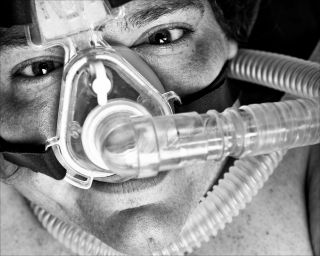

If I Snore Too Much Will I Lose My Memory?
The qualified answer – maybe. It’s been known for a long time that severe sleep apnea provokes memory problems. But what about not so severe apnea?
A group at NYU decided to find out.
What Did They Do?
Repurposed an old study. A cohort population study looking over time at changes in neuroimaging and Alzheimer’s anatomic change was retrospectively rejiggered to look at sleep disordered breathing. As the beginning hypothesis was not testing whether sleep disordered breathing causes memory loss, the result is not quite kosher. It’s still interesting.
What Was Found?
The worse the sleep disordered breathing, the earlier the onset of memory loss. The difference was about ten years - those who had problems with sleep apnea developed mild cognitive impairment ten years earlier than those who did not.
The same was not as true for the more severe variant, Alzheimer’s. Only in the “most conservative” diagnosed group did sleep apnea produce Alzheimer’s earlier.
Still, failing memory ten years early looks important. People want to preserve their memories. It turns out there is a way to do it.
Did Treatment Work?
Once again, in a retrospective study (even one trying to appear prospective) not much can be certain. Yet those who did get CPAP treatment developed their mild cognitive impairment approximately ten years later than those who did not.
On paper, it looks like CPAP prevents the type of minimal memory loss lots of people with sleep apnea develop over time – with problems appearing around age 82 rather than 72. It effectively negated the effect of sleep apnea on memory results.
Why Would CPAP Make Such a Difference?
Because it allows people to breathe and sleep. Many people using CPAP machines have levels of apneas below what is seen in the “normal” population.
And sleep matters. If the body has a better chance to reprogram and rebuild itself, memory should be better preserved.
The reasons it will work are legion. One is the efficient use of the “glymphatic” system. People are who able to sleep can use this extraordinary pumping routine of glial cells – “support” cells that get less press than neurons – to clear out all the wastes and fluids that accumulate in the brain during the day. Some estimates are fluid shifts during sleep are ten times what they are in the day. That makes for good housekeeping.
Next comes a particularly problem of apneas – less oxygen to the brain. It’s been known a long time that even quick on and off decreases in oxygen damages brain cells. That makes it harder for them to remake themselves. It also does no good for the arteries that serve them.
And sleep apnea causes more high blood pressure across the body. It even causes higher pressures inside the brain. It breaks up the normal respiratory-circulatory cycle, which the brain, highly dependent on energy flow, needs to function.
So What Does This Mean for Me and My Family?
Lots of people want to avoid memory loss. It’s crippling. Alzheimer’s itself is fatal.
So doing anything that keeps it at bay is a major public health project.
Fortunately what works in keeping the population healthy also tends to prevent sleep apnea.
In people over 65, sleep apnea – defined as five or more stopped breathing episodes per hour – is really common. Previously, rather small studies have only shown sleep apnea provoking more Alzheimer’s accompanied by marked decreases in oxygen saturation.
But that may not be the case. And apnea rates are strongly related to obesity. The older we get, the bigger we get – as a population. Though some tail thin individuals develop sleep apnea, weight gain – and its distribution – is a big factor.
So if you want to limit your risk of sleep apnea and memory loss, walking works. Walking after meals works. Eating whole foods with less of the specially attached salt, sugar and fat in processed foods works.
Better, all the other factors that seem to prevent cardiovascular disease – like having friends and acquaintances, frequently getting out of the house (increasing novelty, socialization and movement,) having regular patterns of eating and waking - all prove helpful and healthful.
Such healthy activity leads to less sleep apnea. They also lead to less cognitive impairment. The cleaner one’s arteries, the less likely Alzheimer’s disease becomes.
And for those who need it CPAP should work. It may not greatly affect lifespan in the elderly (it does in younger populations,) but it can make people sharper, more productive, and perhaps less prone to forget.
To not forget as we age, we should remember how humans are built. Use your body the way it’s built and folks can long, healthy life. And normal breathing – both at night and during the day – is a big part of that.



